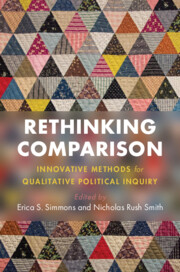Book contents
- Frontmatter
- Dedication
- Contents
- List of Figures
- List of Tables
- List of Contributors
- Acknowledgments
- 1 Rethinking Comparison: An Introduction
- Part I Rethinking the Building Blocks of Comparison
- Part II Developing New Approaches to Comparison through Research
- 7 Comparing Complex Cases Using Archival Research
- 8 Composing Comparisons: Studying Configurations of Relations in Social Network Research
- 9 Against Methodological Nationalism: Seeing Comparisons as Encompassing through the Arab Uprisings
- 10 Comparative Analysis for Theory Development
- 11 Problems and Possibilities of Comparison across Regime Types: Examples Involving China
- 12 Comparisons with an Ethnographic Sensibility: Studies of Protest and Vigilantism
- Theory and Imagination in Comparative Politics: An Interview with Lisa Wedeen
- Index
8 - Composing Comparisons: Studying Configurations of Relations in Social Network Research
from Part II - Developing New Approaches to Comparison through Research
Published online by Cambridge University Press: 24 September 2021
- Frontmatter
- Dedication
- Contents
- List of Figures
- List of Tables
- List of Contributors
- Acknowledgments
- 1 Rethinking Comparison: An Introduction
- Part I Rethinking the Building Blocks of Comparison
- Part II Developing New Approaches to Comparison through Research
- 7 Comparing Complex Cases Using Archival Research
- 8 Composing Comparisons: Studying Configurations of Relations in Social Network Research
- 9 Against Methodological Nationalism: Seeing Comparisons as Encompassing through the Arab Uprisings
- 10 Comparative Analysis for Theory Development
- 11 Problems and Possibilities of Comparison across Regime Types: Examples Involving China
- 12 Comparisons with an Ethnographic Sensibility: Studies of Protest and Vigilantism
- Theory and Imagination in Comparative Politics: An Interview with Lisa Wedeen
- Index
Summary
This chapter examines the trajectory of a research project on militant organizations’ adaptation that began as a “classic” case comparison and was “re-cased” into an explicitly network-based comparison of intra-organizational networks. In doing so, it outlines a method of comparison focused primarily on roles, relations, and emergence rather than on organizational form or behavior. The chapter starts by discussing the project’s initial research design, which proposed a study of militant organizations across three Palestinian refugee camps in Lebanon that largely adhered to Millian logic. The project dedicated extensive research time to establishing a pre-invasion “control” by seeking to demonstrate pre-shock organizational uniformity across the communities under study. However, the evidence gathered often complicated or contradicted logics of control, independence, causality, and identification that undergird dominant approaches to comparison. Rather, it repeatedly indicated that complex, relational, often contingent interactions among geographic environment, communities’ interpretations of violence, and organizational structures influenced outcomes of interest. The chapter leverages this experience to establish core tenets of a broader approach to studying organizational change in comparative perspective.
Keywords
- Type
- Chapter
- Information
- Rethinking ComparisonInnovative Methods for Qualitative Political Inquiry, pp. 152 - 171Publisher: Cambridge University PressPrint publication year: 2021
- 3
- Cited by

